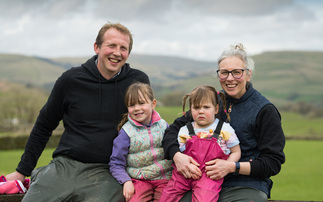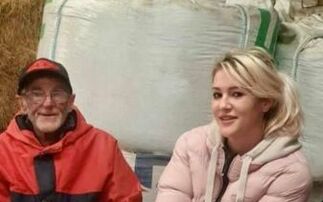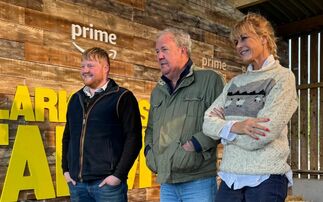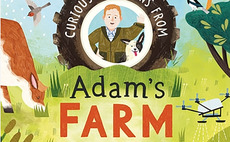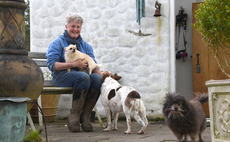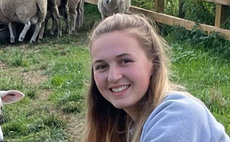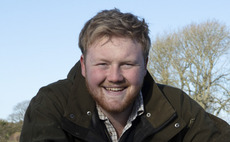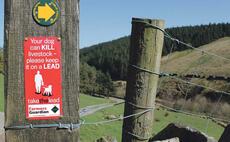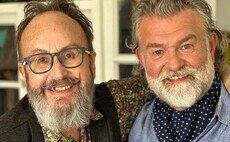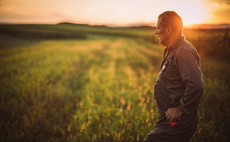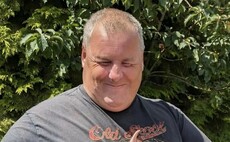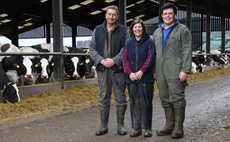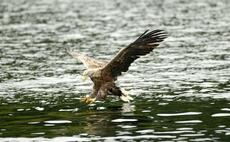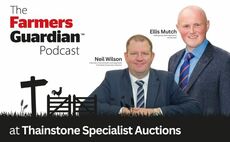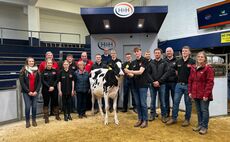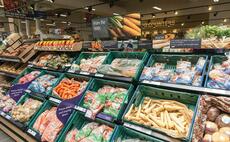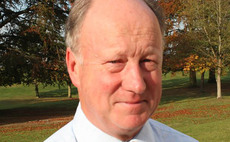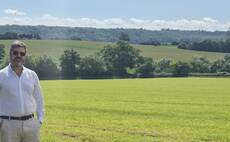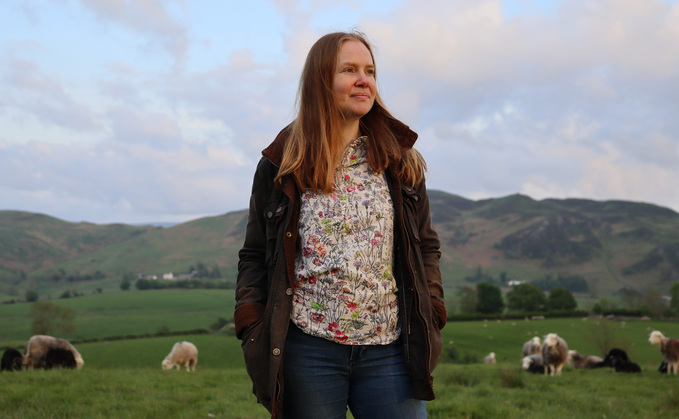
Helen's book, The Farmer's Wife, is a Sunday Times best-seller
Walking into the Rebanks' kitchen, you immediately feel welcome. Helen greets you with a hug as if she has known you all her life, and there is fresh coffee on the table plus homemade biscuits in the shape of Herdwick sheep.
Racy Ghyll Farm is home to Helen, her husband James, and their tribe of four children. Their little piece of heaven sits neatly in the hills of Penruddick near Penrith.
Although Helen may have slightly rebelled against the familiar rhythm of daily farm life through her teenage years, this is where her heart is, having grown up only six miles away.
Many will know her through social media, particularly her Instagram, The Shepherd's Wife, which has gathered a loyal following of over 25,000. Her account is an extension of her own life; a life lived quietly and wholesomely out in the hills.
Watch the YouTube video from the heart of Helen's kitchen:
Helen's father ran about 80-100 Friesian cows, alongside sheep and beef cattle, and her grandad was well-known for his Clydesdale horses. This area and this land hold a lot of memories for her.
"It was a busy farmhouse with lots going on," says Helen.
"Mum ran a bed and breakfast as well, and I found I was able to earn a bit of pocket money helping mum cook breakfasts and things.
"We kept the house as clean and tidy as we could because there were visitors coming all the time.
"Some became firm family friends and would stop off and see us every year.
"There was an old couple who even came to my wedding; they had stayed with us for years.
"Mum made everyone feel like it was a home from home."
Enter here for a chance to win a signed copy!
There is no doubt this is a talent Helen harbours too. She has, she says, ‘grown up with that feeling of keeping it all tidy'.
The pull of the Lake District never really left her - or James - even though both moved away to experience life away from the farm.
"As a teenager, I saw it as a bit of a bind - the whole milking regime and we never really got off the farm," says Helen.
"I felt like I wanted to spread my wings.
"I thought to myself: 'I am going to go to art college and be creative and ask questions about the world - painting, music, books'. I love the arts in any form.
"I went to university, and I thought: 'this is rubbish'.
"I did not fit in, so I moved home and transferred to Carlisle and did a fine art degree there.
"I had met James at that point - he was reading a lot and I thought: 'who is this guy who works on a farm and reads a lot of books?' Nobody really knew that side of him.
"Then he went off to Australia for four months, but he sent me postcards and we blossomed from there.
"Life took us on a bit of a journey - we went to Oxford as he was studying down there."
Times were a little tough given the expense of everything; a young couple trying to make their way in Oxford was ‘challenging' but both were determined to give it a real chance.
As most young people do, Helen began questioning how she was going to utilise her degree and wondered what the future held.
Listen to: The Farmers Guardian podcast with Helen Rebanks
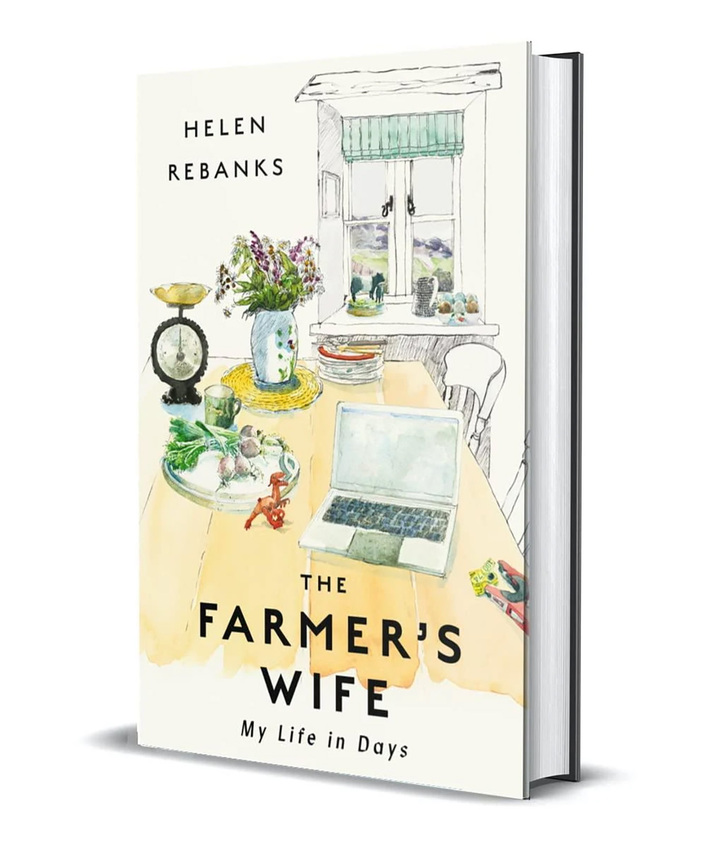
She says: "I had this feeling of 'what am I going to? Who am I going to be?'
"It was when I was baking that I really felt at home - I was working in cafes; anything to pay the bills.
"At that time, cafes were sourcing all sorts of bought-in things from factories and I saw an opportunity to start selling them. I started this illicit baking business from our flat in Oxford and supplied farm shops and cafes.
"You should get off the farm and go and see other places and see how other people are living life, whatever that looks like. It gives perspective.
"But for me, it solidified that home was where I was drawn to, just like James was - his ambition was to get back and turn this barn that we are sitting in into a home.
"It is in his blood, and it is in mine too, which I did not quite realise.
"I am now knee-deep in kids, sheep, cows, dogs, cakes and cooking, and busy hosting visitors.
"I absolutely love it and could not be happier."
Helen and James' story is one of those ‘meant to be' stories, and when asked if she could ever have imagined staying in the city and making a different life for herself, she simply says that if she was with James then she would always be okay.
After moving back to Cumbria, the next chapter of their life began. Both have an invested interest in nature, and James is renowned for his environmental passions, especially regarding the future and support of hill farmers.
All of this - her journey away from her parents, meeting James, trying a new way of life and then moving back to Penrith - inspired her to write her newly released book The Farmer's Wife. It is an ode to the women who take on what are seen as the more 'traditional' roles but play an all-important part in the family unit.
"I wanted to write the book that I needed to read when I was a young woman," says Helen.
"I want to say: this is your choice, and this is a great life.
"I had a lot of outside media influences in my 20s; you look in magazines and it is all clean-cut clothes and no dirt on the boots, telling you to go and have this wonderful life away from the farm, but there was nothing about children, looking after family or elderly parents, or about being connected with community.
"It was always about an individual life, and it did not sit right with me and the way I was brought up.
"It felt like the modern world was telling me to be something that did not feel right.
"So, I held an arm out and said 'no'."
Her book is deeply personal and documents her ‘life in days', from parts of life such as her desire to be a mother and the tragedy of a miscarriage, through to memories of her grandmother cooking and the realisation of the choices her own mother made.
"When I became pregnant with Mollie, I was on a mission to be mum; everything else fell away.
"We were three, then four, and now we are a tribe of six - teenage girls and young boys and just full of life."
Woven through the book are an ‘eclectic' mix of recipes, from Spanish chicken stew to shortbread and custard.
These recipes are a nod to the wonder Helen finds in living simply; cooking for her loved ones and allowing the home to be the epicentre of their life.
"Food allows you have conversations around the table; it is a way of showing love, making people's favourite things. It is memories, stories, connection.
"Looking back, I did not appreciate how good our childhood was.
"We were eating simple food from the land and had a freezer full of lamb and beef - just as it is here now.
"When we moved away, I had access to all these different flavours and ingredients, but I wanted to go back to a simpler life and think about eating local, British-farmed produce.
"Let us think about our environmental footprint.
"I have an 80:20 balance when shopping: 80 per cent is as good as it can be - the whole foods like meat, cheese, yoghurt - these are the staples.
"I try and cook from scratch whenever possible and use all the leftovers.
"Then 20 per cent is cookies or crisps - I have four children and that is real life.
"Knowing where your food comes from is massive, otherwise we are buying all sorts of things where we have no idea about how it is farmed or the environmental cost.
"By buying local you can influence that, and you can support your local farmer.
"It happened in lockdown, and we saw how important it is to have food within a few miles of where we live - we are only a disaster away from having empty shelves."
For Helen, food produced in a nature-first manner is the key to health. It is two sides of the same coin; healthy, nutritious food produced by farmers who are intrinsically connected to the land and dedicated to protecting it. It is also about championing this way of life, which has been lived by generations before them.
They run a traditional hill farm 1,100 feet above sea level, with Herdwick sheep and a herd of Belted Galloways.
It is a low-input, extensive system, and having made a few ‘tweaks and letting everything grow a bit more', they have seen wildlife flourish.
"They say ‘build it and they will come', but we did not realise how quickly," says Helen.
"There are barn owls after a period of them not being here, and herons love to be in the field when the grass is a bit longer.
"There are heaps of insects and bats - it is a very noisy farm.
"Farming is good for the land and for nature, and it thrives because of what we are doing.
"There is so much life. If we lose small family farms, where is our food going to come from? Cheap imports?
"These areas are well suited to rearing sheep and cattle; the ancient tradition of gathering in the farming community is part of our cultural heritage."
The book has already become a Sunday Times bestseller - and to think, it all started out as a way to perhaps document her recipes for the kids.
Her story is the story of countless women; of a societal change that has questioned what role the next generation of women will play.
Helen says: "I asked myself: 'who I am I? Where am I from? What makes a good life?'
"In some ways, I am a modern woman living an old-fashioned life.
"It is really personal, and it gave me a chance to reflect. This is an important life and quite a lot of it is invisible; it is domestic, and people do not value that.
"I wanted to speak up and be the voice of a role that is not talked about in modern life very much. I want women to feel appreciated.
"There are some incredible women in farming, and I just wanted to say this is a great life and a beautiful place to raise our children with values that I think are important.
"I am really proud, and I hope the children see their history in it, if and when they choose to read it.
"It is a family story - it is my story."












